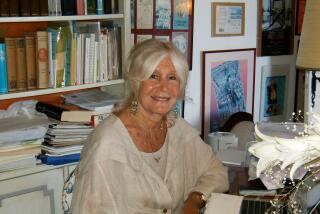Francoise Sagan, 69; French Writerâs First Novel Created a Sensation
Francoise Sagan, the French writer who made international headlines as a teenager with her precocious first novel, âBonjour Tristesse,â died Friday. She was 69.
Sagan died of heart and lung failure at a hospital near her home in Normandy.
Born Francoise Quoirez to a well-to-do family in Cajarc in southwestern France, Sagan -- who took her pseudonym from a character in Marcel Proustâs âRemembrance of Things Pastâ -- was educated in private and convent schools at home and in Switzerland.
She wrote âBonjour Tristesseâ (âHello Sadnessâ) in 1953 while on a summer holiday from her studies at the Sorbonne. Sagan, then 18, completed the manuscript in just six weeks.
The work was the story of Cecile, a worldly 17-year-old girl who plots to break up her philandering fatherâs sudden engagement to his former mistress by plotting the womanâs death.
The short novel -- it ran just 188 pages -- brought Sagan instant celebrity and wealth.
It also created a furor in France when it was published in 1954. Some critics scorned the book as nothing more than a tale of passionless hedonism. Sagan was called immoral and was viewed as a spokesperson for a generation of bored and blase young adults.
Nevertheless, the book sold more than 500,000 copies in its first year in France, and eventually sold 1.5 million copies there.
It was also a major bestseller in the United States when it was translated and published in 1955. It was eventually translated into more than 15 languages and sold 2 million copies worldwide.
Her second novel, âUn Certain Sourireâ ( âA Certain Smileâ), was the story of a brief but passionate affair between a 20-year-old Sorbonne student and a married man nearly twice her age. It also sold well and was seen as prescient when, in 1957, Sagan married Guy Schoeller, a publisher 20 years her senior. They divorced two years later.
Sagan wrote more than 30 novels as well as nine plays in her career. Many of her books ended up on the bestseller lists in France.
âBonjour Tristesseâ and âUn Certain Sourireâ were made into American films, as was her novel âAimez-Vous Brahms?â under the title âGoodbye Again.â Many of her other novels and plays were filmed for television in France.
In âNightbird: Conversations With Francoise Sagan,â she said her main themes were âlove and loneliness,â and she said she found the âreal dramaâ in those everyday emotions. She said she was fascinated by the âconstant lonelinessâ of so many people and insisted, âThatâs not a minor, harmless theme.â
Saganâs life made headlines in France and abroad. She was known to have a penchant for the fast life, and her money seemed to go out faster than it came in.
She had many legal problems as well.
In the mid-1990s, she was fined for using cocaine and ordered by the court to seek drug treatment.
Two years ago, she was convicted for not declaring about $723,000 to tax authorities. She was given a 12-month suspended jail sentence.
During her tax trial, she claimed she was penniless and that the money had come from friends trying to help her restore her fire-damaged home in Normandy.
Her second marriage, to American sculptor Robert Westhoff, also ended in divorce.
Sagan is survived by a son, David, from that marriage.
Funeral arrangements were pending.
More to Read
Sign up for our Book Club newsletter
Get the latest news, events and more from the Los Angeles Times Book Club, and help us get L.A. reading and talking.
You may occasionally receive promotional content from the Los Angeles Times.








